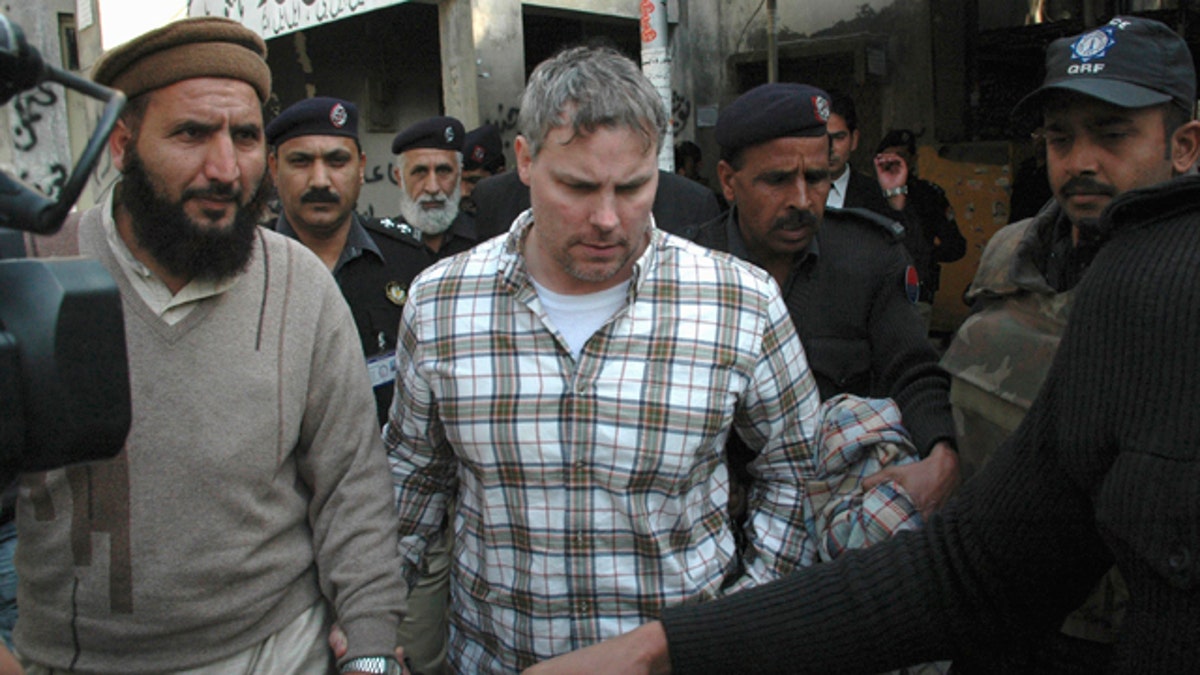
Jan. 28: Pakistani security officials escort a U.S. consulate employee, identified as Raymond Davis, to a local court in Lahore, Pakistan. Colorado authorities say Davis, accused of shooting and killing two men while working as CIA contractor in Pakistan, faces misdemeanor charges after a fight Saturday, Oct. 1, 2011, over a shopping center parking spot in Highlands Ranch, Colo. (AP)
A surprising deferral by Pakistan’s High Court to a lower tribunal in the case of CIA contractor Raymond Davis is a major setback for U.S. attempts to have him freed, according to sources familiar with the case.
The decision, handed down in Lahore on Monday, means Davis, arrested in January for shooting dead two gunmen in Pakistan’s second-largest city, will now face a criminal court Wednesday.
“The decision to pass the ruling to a lower court is because the High Court was the only court available for him to appear at the time of the murders. His immunity was only in question then,” prosecutor Asad Manzoor Butt told Fox News. “Now, following the police investigation, a criminal court is the appropriate place for his immunity to be decided.”
Butt maintained Davis still has not provided proof of diplomatic immunity.
According to Pakistani officials, Davis was registered as an Islamabad Embassy official in January 2010, but then re-registered as a consular official in Lahore in January of this year. Embassy officials under the 1961 Vienna Convention are awarded immunity, but under a 1963 amendment consular officials receive no such protection.
Embassy sources say the State Department is resigned to the fact that Davis will most likely be found guilty in a trial.
A U.S. diplomat also tells Fox News that while Davis’ court appearance Wednesday will likely commit him to a trial, it is more "kicking the can along" to buy time while the CIA and Pakistan’s intelligence agency -- the ISI -- wrestle out a deal that accommodates the two countries.
In order to try and secure his release, he or the U.S. government could pay blood money to compensate the families, as is accepted in Islam and under Pakistani law. The victims’ families could either request this at any point in the trial or wait for it to be offered before the trial starts. The families also have the chilling right to demand eye-for-an-eye/tooth-for-a-tooth killing of one of Davis' relatives. They could even choose to drop all charges if they choose to let the matter rest; by law the police would then have to drop the case.
Another hope for Davis is that Pakistan's politicians, who have remained largely aloof on the issue until now, will intervene to argue the Vienna Convention has not been fully considered and that, as a signatory, Pakistan is obliged to adhere to international law.
Pakistan’s Foreign Ministry began publicly discussing this possibility over the weekend. But politicians will first have to allow Davis be found guilty in order to placate Pakistan’s fervent anti-U.S. elements of the public, opposition and religious establishment.
Davis potentially faces charges for five murders -- the two gunmen, a pedestrian run over by a U.S. Embassy vehicle that rushed to his aid at the scene, the wife of one of the gunmen who committed suicide following his death and an operative allegedly hired by Davis to infiltrate the Islamic militant group Lashkar-e-Taiba. Davis could even face charges of funding terrorists.
Fox News sources within the ISI say Davis financed Laskar-e-Taiba, money that was used for terror-related activities, including killings.
Pakistani authorities also say they are now investigating another 55 U.S. citizens issued with visas in the past year on suspicion of being covert CIA agents or contractors. The names, identification numbers and visa details of all 55 Americans were published in a Pakistani newspaper over the weekend, prompting protests from the U.S. Embassy.
“It is inaccurate and the allegations in the article are false,” said Alberto Rodriguez, spokesman for the U.S. Embassy in Islamabad.
It is understood that while some of the 55 may already be in Pakistan, some have since left the country or have not yet even visited.
